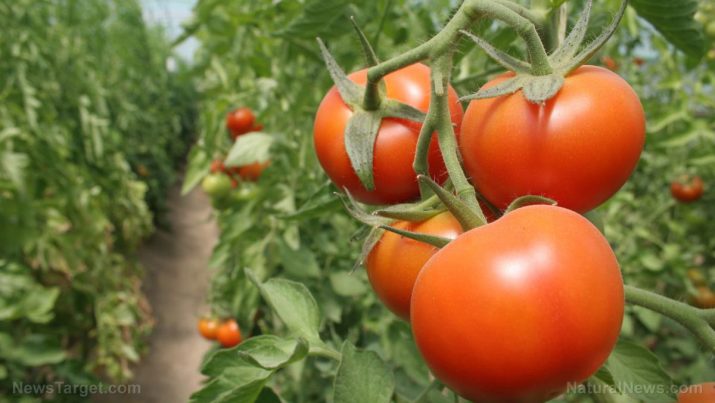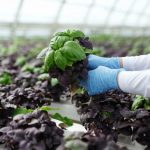
Tomato plants grown in heavy metal contaminated soil found to produce contaminated fruit
Sunday, January 14, 2018 by Isabelle Z.
http://www.biosludge.news/2018-01-14-tomato-plants-grown-in-heavy-metal-contaminated-soil-found-to-produce-contaminated-fruit.html

As many people strive to start out the new year with healthy eating habits, it’s important to keep in mind that choosing the right vegetables is just as important to your health as consuming them in the first place. That’s because vegetables are prone to contamination not only from pesticides but also from the air, water and soil in which they are grown.
In a recent study, researchers set out to find how heavy metal contamination in soil affects the physical and biochemical properties of tomatoes. The scientists measured several characteristics of tomatoes harvested from contaminated soil, including their fresh and dry weights, titratable activity, volume, diameter, length, carbohydrate content and lycopene levels. They also examined secondary metabolites like flavonoids and total phenols, along with macronutrients and micronutrients. In addition, the researchers measured residual heavy metals like lead, cadmium, nickel and cobalt.
The researchers then compared these results to those of tomatoes that were cultivated in soil that was not contaminated. Not surprisingly, heavy metal soil contamination had an adverse impact on the tomatoes’ lycopene levels, ascorbic acid, carbohydrate content, microelements, total soluble solids and titrable activity, in addition to the expected and very dangerous higher levels of heavy metals.
Heavy metals in vegetables a serious health concern
According to the European Food Safety Authority, the accumulation of heavy metals in the body can be very harmful. For example, one of the heavy metals found in the tomato study, nickel, can cause allergic reactions upon short-term exposure, and long-term exposure has been linked to developmental and reproductive effects in animal studies.
Another metal in the study, lead, is highly concerning because of its extreme toxicity even in small amounts. According to the FDA, lead that gets into tomatoes and other plants through the soil while growing cannot be washed away completely. No level of lead is considered safe, and chronic exposure leads to nervous system and brain damage, developmental delays, hearing and speech issues, learning problems, and behavioral issues.
Foods are the main source of exposure to cadmium for those who don’t smoke, and vegetables are one of the biggest contributors to this. It’s particularly concerning to vegetarians, who tend to have higher dietary exposure to cadmium-containing foods. It causes kidney toxicity and can lead to renal failure as well as bone demineralization, and it has been classified as a human carcinogen. In addition, cadmium has been linked to a higher risk of lung, bladder, breast and endometrial cancer, making avoiding this heavy metal as much as possible absolutely essential.
Take matters into your own hands
The researchers recommend that people avoid eating tomatoes cultivated in areas with contamination to avoid the buildup of heavy metals in their bodies. Studies like this one serve to illustrate the importance of trusting the source of your produce. After all, without a laboratory in your home, how would you even know if the tomatoes you are eating were cultivated in contaminated soil?
One of the best ways to give yourself peace of mind is by growing tomatoes yourself. Secure a trustworthy source of uncontaminated soil and organic seeds, and simply grow your own. There may be a bit of trial and error involved at first, but growing tomatoes is not as complicated as it may seem. There are products available to help you grow tomatoes in limited space if you live in an apartment or don’t have a big yard.
Just a single tomato plant will yield around ten pounds of fruit throughout a season, and the plants will bear tomatoes throughout the year in most places.
Avoiding heavy metals is certainly enough of a reward on its own, but many people find that homegrown tomatoes are also a lot more flavorful than their store-bought counterparts, making this an endeavor that will pay off in many ways for years to come.
Sources include:
Tagged Under: Tags: badfood, badhealth, badpollution, cadmium, contamination, food production, goodscience, growing tomatoes, Heavy metals, heavy metals in soil, home gardening, Lead, nickel, soil pollution, soils, tomato contamination, tomatoes





